The Bundesvision Song Contest was a song competition held annually between the sixteen states of Germany. Created by German entertainer Stefan Raab and aired live on ProSieben, the show was loosely based on the Eurovision Song Contest, with slightly different rules aiming at promoting German-language music by requiring that at least 50% of each song's lyrics were performed in German.

Iceland has participated in the Eurovision Song Contest 36 times since its debut in 1986, missing only two contests since then, in 1998 and 2002, when prevented from competing due to finishing outside qualification places the preceding years. The country's best result is second place, which it achieved with Selma in 1999 and Yohanna in 2009. The Icelandic broadcaster for the contest is Ríkisútvarpið (RÚV), which also broadcasts Iceland's national selection competition, Söngvakeppnin.

Belarus has participated in the Junior Eurovision Song Contest in every edition since its inception in 2003 until 2020. The Belarusian Television and Radio Company (BTRC), then a member organisation of the European Broadcasting Union (EBU), has been responsible for the selection process of its participants since its debut. The country hosted the contest at the Minsk-Arena in 2010 and again in 2018.

The participation of Georgia in the Junior Eurovision Song Contest first began at the Junior Eurovision Song Contest in 2007 which took place in Rotterdam, Netherlands. The Georgian Public Broadcaster (GPB), a member organisation of the European Broadcasting Union (EBU), have been responsible for the selection process of their participants since their debut. The first representative to participate for the nation at the 2007 contest was Mariam Romelashvili with the song "Odelia Ranuni", which finished in fourth place out of seventeen participating entries, achieving a score of one hundred and sixteen points. Since their debut, Georgia has never missed an edition of the contest, with three of these participations resulting in a win. These wins occurred in 2008, 2011 and 2016, making Georgia the most successful country in the contest, alongside France. They hosted the contest for the first time in 2017 at the Olympic Palace in Tbilisi.

The ABU TV Song Festival is an annual non-competitive gala that showcases songs or instrumentals by musicians across Asia, organised by the Asia-Pacific Broadcasting Union (ABU). Participating countries which have full or additional full ABU membership are invited to submit a song to be performed in front of a live audience. It is live recorded so that each of the national broadcasters may add subtitles in their respective Asian languages.

The Junior Eurovision Song Contest 2014 was the 12th edition of the annual Junior Eurovision Song Contest, and took place, for the first time, in Malta. This was the third time that the contest was hosted by the previous year's winning country. Maltese national broadcaster PBS was the host broadcaster for the event. The final took place on 15 November 2014 and was in the Malta Shipbuilding in Marsa, near Valletta. Moira Delia, a Maltese television personality, hosted the show, marking the first time in Junior Eurovision history that there was only one presenter of the show.

The Turkvision Song Contest, also known as the Türkvizyon Song Contest, has been a recurring song contest created by Turkish music channel TMB TV, inspired by the format of the Eurovision Song Contest. The first edition took place in Eskişehir, Turkey in December 2013. Countries and regions which were Turkic-speaking and of Turkic ethnicity were eligible to participate in the song contest. The contest was last held on 20 December 2020 as an online event hosted from Istanbul, Turkey. Several cancellations followed, and the future of the Turkvision Song Contest now remains uncertain.

The Junior Eurovision Song Contest 2015 was the thirteenth edition of the annual Junior Eurovision Song Contest, and took place, for the first time, in Bulgaria. The Bulgarian national broadcaster BNT was the host broadcaster for the event. The final took place on 21 November 2015 and was held at the Arena Armeec in Sofia. Poli Genova, a Bulgarian singer and former representative of Bulgaria in the Eurovision Song Contest 2011, hosted the show. A total of seventeen countries participated, with Australia and Ireland making their debuts. Albania and Macedonia returned after being absent since the 2012 and 2013 contests, respectively. Croatia and Cyprus withdrew after returning in the 2014 edition, while Sweden withdrew for the first time since 2008.

The ABU TV Song Festival 2015 was the fourth annual edition of the ABU TV Song Festivals. The event, which is non-competitive, took place in Istanbul, Turkey and coinciding with the 52nd General Assembly of the Asia-Pacific Broadcasting Union (ABU) which was scheduled for 28 October 2015. Twelve countries have confirmed their participation.

The Turkvision Song Contest 2015 was the third edition of the Turkvision Song Contest, which took place in Istanbul, Turkey; and organised by Turkish Music Box Television (TMB). A total of twenty-one Turkic regions, which have either a large Turkic population or a widely spoken Turkic language, participated in the contest, as well as one Turkic ethnic groups who do not have a defined region. Several regions of the Russian Federation were on the preliminary participation list for the contest, but were later forced to withdraw due to the Ministry of Culture banning Russian regions from the TURKSOY organisation. There was no semi-final this year, whilst the final took place on 19 December 2015.

The Eurovision Young Musicians 2016 was the eighteenth edition of the Eurovision Young Musicians contest, which took place on 3 September 2016, outside the Cologne Cathedral, in Cologne, Germany. For a second consecutive time, German public broadcaster Westdeutscher Rundfunk (WDR) was the host broadcaster for the event, with Daniel Hope and Tamina Kallert being the presenters for the show. Musicians representing eleven countries with European Broadcasting Union (EBU) membership, participated in the contest, with San Marino making their debut, while Greece, Moldova, Netherlands, and Portugal decided not to participate in this edition. The candidates were accompanied by the WDR Symphony Orchestra Cologne, conducted by Clemens Schuldt. A five-person jury decided which of the participants would be awarded with the top-three prizes. Łukasz Dyczko of Poland won the contest, with Czech Republic and Austria placing second and third respectively.
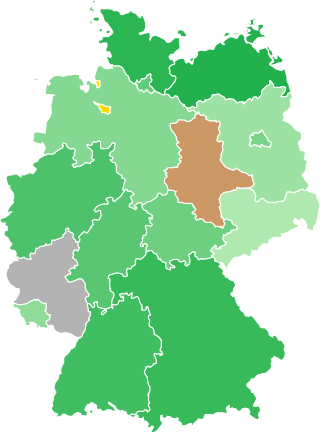
The Bundesvision Song Contest 2014 was the tenth edition of the annual Bundesvision Song Contest musical event. The contest was held on 20 September 2014 at the Lokhalle in Göttingen, Lower Saxony, following Bosse's win in the 2012 contest in Berlin with the song "So oder so". The contest was hosted by Stefan Raab, and Elton in the green room.
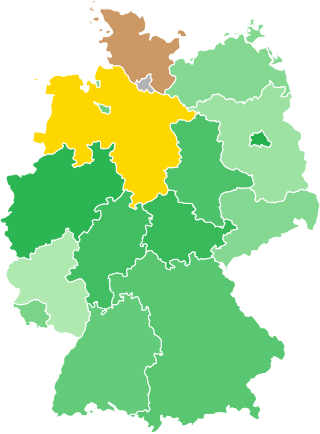
The Bundesvision Song Contest 2007 was the third edition of the annual televised Bundesvision Song Contest, a German reality singing contest. The contest was held on 9 February 2007 at the Tempodrom in Berlin, following Seeed's win in the 2006 contest in Hesse with the song "Ding". The contest was hosted by Stefan Raab, Johanna Klum, and Elton in the green room.

The Eurovision Young Dancers 2017 was the fifteenth and final edition of the Eurovision Young Dancers competition. The final took place at the Prague Congress Centre in the Czech capital, Prague on 16 December 2017. This was the second consecutive time that the Czech national broadcaster, Česká televize (ČT), organised the contest. The event is aimed at young dancers aged between 16 and 21, competing in modern dances, be it solo or in couples, as long as they were not professionally engaged.
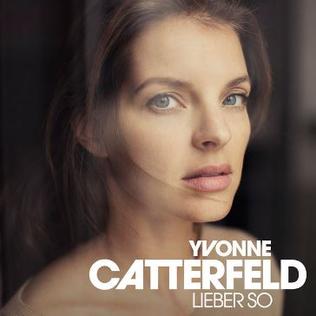
"Lieber so" is a song by German recording artist Yvonne Catterfeld, recorded for her same-titled sixth studio album (2013). It was written by Marcus Brosch and Katharina "Kitty Kat" Löwel and produced by Roland Spremberg. A melancholic folk pop ballad, the song's lyrics revolve around the breakdown of a relationship with the female protagonist expressing her love for a man whom she attempts to leave. The instrumentation of "Lieber so" includes an acoustic guitar, a cello and a glockenspiel.

The Junior Eurovision Song Contest 2016 was the fourteenth edition of the annual Junior Eurovision Song Contest, which took place at the Mediterranean Conference Centre, in Valletta, Malta. This was the second time that Malta have hosted the Junior Eurovision Song Contest, their first being in 2014. Jon Ola Sand was appointed as the Executive Supervisor for the 2016 Junior Eurovision Song Contest, following the dismissal of the former supervisor, Vladislav Yakovlev.
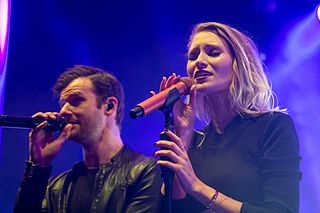
Glasperlenspiel is a German electropop duo from Stockach, consisting of vocalist Carolin Niemczyk, and keyboardist Daniel Grunenberg.
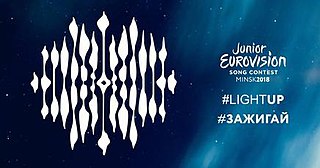
The Junior Eurovision Song Contest 2018 was the sixteenth edition of the annual Junior Eurovision Song Contest, organised by the Belarusian Television and Radio Company (BTRC) and the European Broadcasting Union (EBU). It took place in the Belarusian capital city, Minsk on 25 November 2018 at the Minsk-Arena. It was the second time that the contest was held in Belarus, after it staged the 2010 edition at the same venue.

The Junior Eurovision Song Contest 2020 was the 18th edition of the annual Junior Eurovision Song Contest, organised by Telewizja Polska (TVP) and the European Broadcasting Union (EBU). The contest took place on 29 November 2020, and was held in Warsaw, Poland, following the country's victory at the 2019 contest with the song "Superhero" by Viki Gabor. This was the first time the contest was held in the same country for two consecutive years.

The Free European Song Contest is an international song competition, organised by the German television network ProSieben and the production company Brainpool TV, with participants representing primarily European countries. The contest is similar in format to the long-running Eurovision Song Contest: each participating country submits an original song to be performed on live television, then casts votes for the other countries' songs to determine the winner.



















